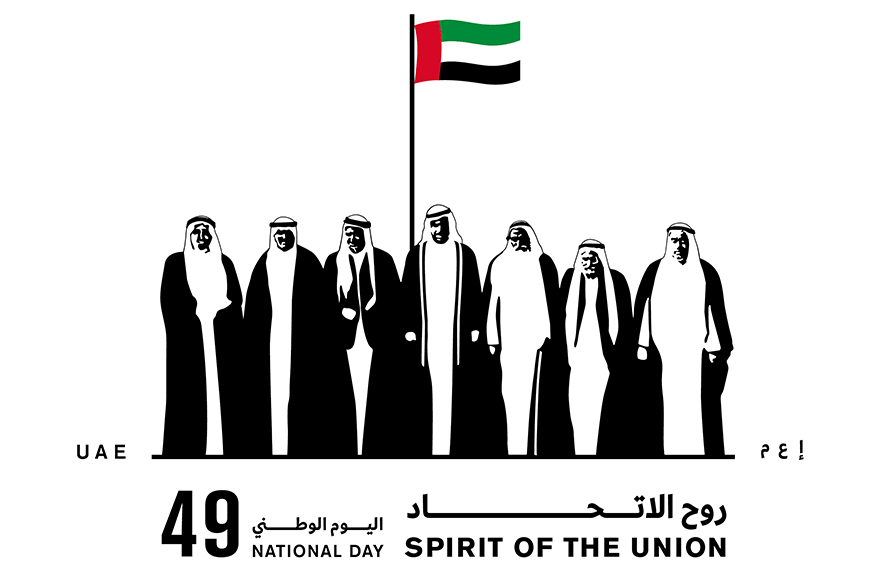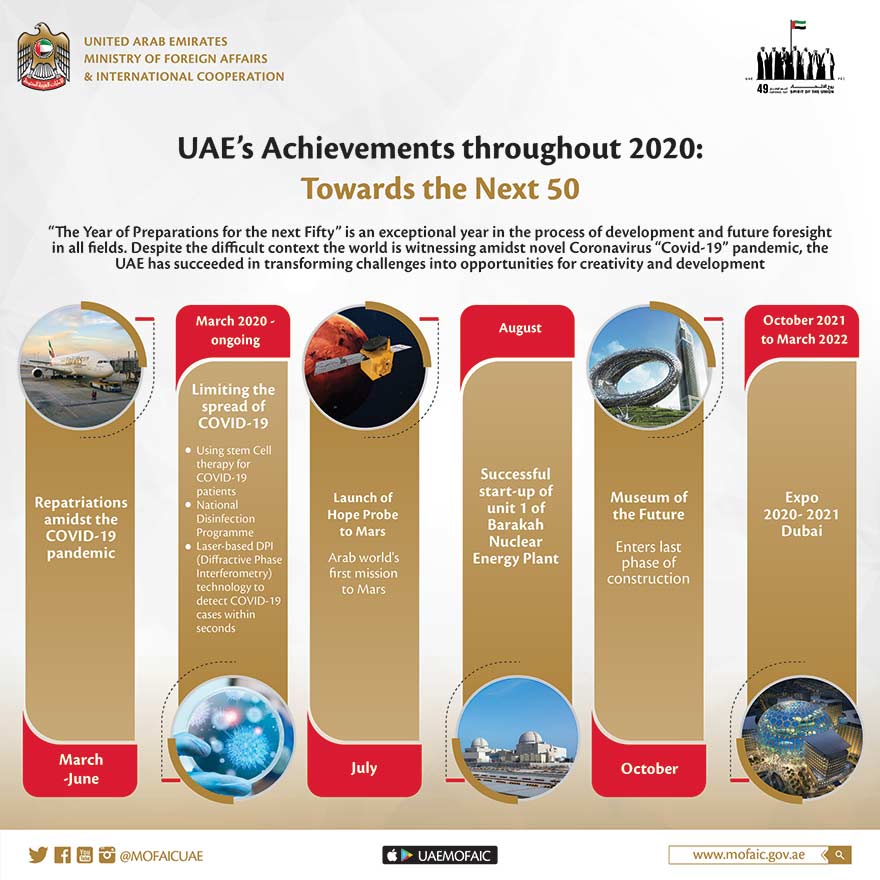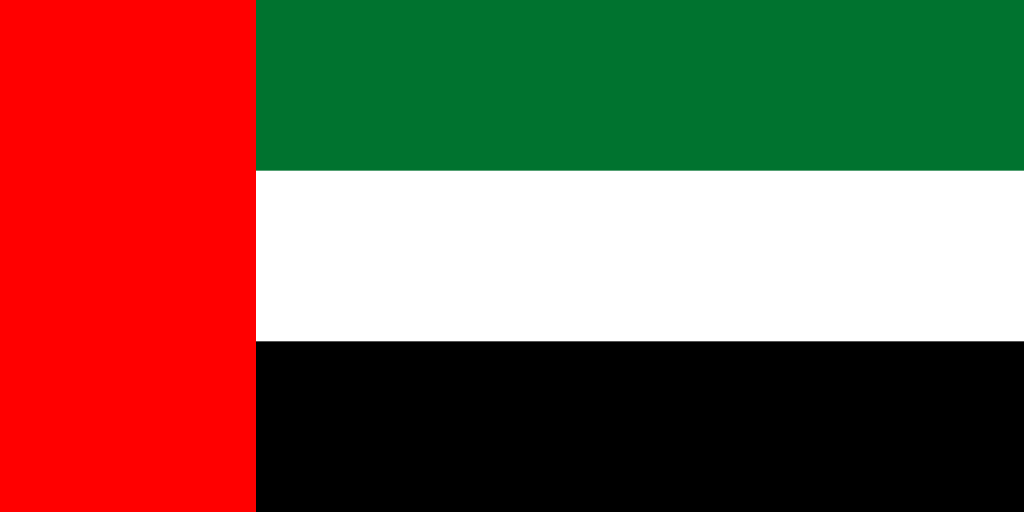The UAE people celebrate their 49th UAE National Day 2020 on the 2nd of December every year. In July 1971, six of the Trucial States (Abu Dhabi, Dubai, Sharjah, Umm al-Quwain, Ajman, and Fujairah) agreed on a Federal Constitution for achieving independence as the United Arab Emirates.
The UAE national day is basically a celebration of the union of the six estates while Ras Al Khaimah joins these six estates on 10th Feb1972. Now the UAE has a total of seven estates. These seven estates combined to form a worldwide modern country, headed by Sheikh Zayed bin Sultan Al Nahyan, the federation’s first president.
The UAE became independent on 2nd December 1971.
49th UAE National Day 2020 is a day of happiness throughout the United Arab Emirates.

The Ministry of Foreign Affairs and International Cooperation’s Report Marking the 49th UAE National Day
His Highness Sheikh Mohammed bin Rashid Al Maktoum, Vice President and Prime Minister of the UAE and Ruler of Dubai, and His Highness Sheikh Mohamed bin Zayed Al Nahyan, Crown Prince of Abu Dhabi and Deputy Supreme Commander of the UAE Armed Forces, announced 2020 to be the year of preparations for the next 50 years. The announcement marks the formulation of the largest national strategy of its kind to prepare for the next 50 years on both federal and local levels. It also marks the preparations for the UAE Golden Jubilee celebrations in 2021, where citizens and residents, government and private sector entities, to take part in formulating life in the UAE in the next 50 years.
Upon the announcement of 2020 as the year of preparation for the next 50 years, and the formation of the 50-year Development Plan Committee, task forces started the work to build on the legacy of the founding fathers and the nation’s achievements over the past 50 years.
The UAE fulfilled its goals by ranking first worldwide in 121 indicators, becoming the first among Arab countries in 479 indicators, and among the top five globally in 189 indicators. Today, the UAE is shaping a comprehensive development plan for the next 50 years starting from the UAE’s Golden Jubilee in 2021 until the UAE’s Centennial in 2071.
The UAE takes the initiative to spread peace
Arab peoples have long been eager for a stable, functioning, and prosperous region. It is time for new approaches and thinking to set a new and better path for the future of the region.
In this perspective, HH Sheikh Abdullah bin Zayed Al Nahyan, Minister of Foreign Affairs and International Cooperation signed the Abraham Accords Peace Agreement between the UAE and Israel on September 15, 2020, signaling a new page in the relations between the two countries and promoting concerted efforts to enhance stability and security in our region.
The Agreement is a historic achievement for the UAE, Israel and the US and creates immediate and meaningful security, economic, and social benefits. Indeed, the UAE and Israel are already collaborating closely to expand and intensify research and treatment on the coronavirus, and working groups are making progress on a range of bilateral cooperative initiatives across key sectors. These sectors include logistics, air links, tourism, cultural exchange, education, medical, scientific research, and telecommunications.
The UAE: a pioneer in humanitarian aid
Since its formation in 1971, the United Arab Emirates has delivered unconditional foreign assistance globally to support economic growth in developing countries and provide basic social services to communities in need to improve their quality of life.
The fundamental purpose of UAE foreign assistance is to reduce poverty, promote peace and prosperity, and foster mutually beneficial economic relations through expanding trade and investment ties with developing countries. At the same time, it focuses on specific segments of society with special attention to women and children during natural disasters and in conflict areas.

The UAE provides humanitarian assistance to save lives, alleviate suffering, and protect human dignity in crises. The country has contributed to a wide array of humanitarian emergencies through the multilateral system, as well as through direct assistance. Over 40 UAE charities, foundations, government entities, and private companies have provided humanitarian assistance for those in need.
The UAE will increase humanitarian relief efforts in the years ahead to help people both close to home and across the world. The UAE committed to devoting at least 15 percent of its total foreign aid to humanitarian purposes, which would make the UAE one of the most dedicated donors to humanitarian assistance.
UAE Bid for UN Security Council Membership
The United Arab Emirates seeks elected membership on the United Nations Security Council for the 2022 – 2023 term in order to advance inclusion, spur innovation, build resilience and secure peace.
As a candidate for the Security Council, the UAE will be a constructive partner to address some of the critical challenges of our time: promoting gender equality, fostering tolerance and countering terrorism and extremism, building resiliency to climate change, prioritizing humanitarian relief and sustaining peace, tackling global health crises and pandemics, and harnessing the potential of innovation for peace.
The UAE: a model of coexistence, tolerance and innovation
Individuals from more than 200 nationalities call the UAE home and we are proud to host dozens of Christian churches, two Hindu temples, a Jewish synagogue, a Sikh temple and a Buddhist monastery; in 2022, we will complete the Abrahamic Family House, which will bring together Christian, Jewish and Muslim houses of worship.
As a commercial and creative melting pot at a global crossroads, we seek to bring nations together to seize opportunities provided by new technology, financing approaches, and policies. The UAE uses a model of “future preparedness,” forecasting future opportunities and risks and aligning government to address them, such as when we helped UN Secretary-General António Guterres launch the High-level Panel on Digital Cooperation. In 2020, the UAE’s Mohammed bin Rashid Space Centre launched the first Arab interplanetary research expedition, the Hope Mars Mission, made possible through cooperation with dozens of countries.
MoFAIC: safeguarding the interests of Emirati citizens abroad during one of the most challenging global crisis
The UAE pursued its pioneering humanitarian initiatives to curb the spread of the novel coronavirus (COVID-19) pandemic, an embodiment of its mission that seeks to uphold the values of solidarity and synergy around the world to overcome the repercussions of this crisis.
The Ministry of Foreign Affairs and International Cooperation, in coordination with the National Emergency, Crisis and Disaster Management Authority, led the response plan since the onset of the crisis of the new Coronavirus outbreak, initiating the repatriation of Emirati citizens from a number of affected countries. The UAE also facilitated the repatriation of citizens from brotherly and friendly countries, who were stranded in other countries and unable to return to their homes and families, in a solidary gesture towards countries affected by the pandemic.
In a clear expression of UAE’s humanitarian stance in supporting all those residing on its territory and of the country’s keenness on joint cooperation and coordination with countries around the world to curb the spread of the novel coronavirus, the UAE’s humanitarian initiatives throughout the COVID-19 pandemic included several residents who were abroad upon the announcement of the suspension of flights to and from the UAE.
The UAE has thus delivered medical supplies to over 120 countries in need, assisting more than 1.6 million medical workers worldwide in the fight against the COVID-19 pandemic, a clear demonstration of the considerable potential and capabilities of the UAE aid sector, enabling it to reach over a third of the countries in the world despite difficulties and challenges suffered by most shipping and storage sectors globally.

The humanitarian role of UAE aid sector went beyond sending aid to countries in need; it featured coordination at the highest levels with relevant international organizations and specialized bodies, particularly the World Health Organization, and the World Food Programme and its assistance in delivering medical and food supplies to some countries, strengthening the capacity of these organizations to reach the largest international beneficiary group in all parts of the world and contributing to the provision of the necessary medical supplies.
Diplomacy: Between a New Reality and a Vision for the Future
The COVID-19 crisis imposed the need to adapt to a new reality in all areas, and thus a qualitative shift in the field of diplomacy and a review of future diplomacy.
The cultural marathon saw a series of weekly sessions on various topics from “Space Diplomacy” to “A Focused View of Latin America”, “Lessons in Cultural Diplomacy from Nigeria”, “UAE and Saudi Arabia, Cultural Unity and a Shared Destiny”, as well as “UAE and Japan, Joint Efforts to Tackle Crises”, “The Role of Embassies in the Future”, as well as “Covid-19”: How the crisis helped foster a culture of solidarity.
State embassies and missions abroad also held online cultural talks, including the virtual dialogue on the documentary series “The History of the UAE”, hosted by the UAE Embassy to the United Kingdom.
In this context, the Youth Council of the Ministry of Foreign Affairs and International Cooperation, in cooperation with the Diplomatic Youth Council of the Ministry of Foreign Affairs of the Russian Federation, held a youth workshop entitled “The Future of Diplomacy Post-Covid-19” on June 8, 2020, via video-telecommunication technology. The seminar was hosted by H.E. Ma’ad Hareb Al Khaili, UAE Ambassador to the Federal Republic of Russia, and HE Sergei Kuznetsov, Ambassador of the Russian Republic to the State, in the presence of more than 110 members of the two councils and young people affiliated with the foreign ministries of the two countries. During the talk, young diplomats from both countries discussed views and ideas on the impact of the Covid-19 crisis on future diplomatic work, emphasizing the importance of young people’s role in preparing for the future of diplomacy, and the need to increase the use of virtual tools and modern technology in diplomacy, based on lessons learned from this crisis.
The Post-COVID19 Government and new ministerial decisions
The UAE government has taken several measures in preparation for the future, and in dealing with the aftermath of the Covid-19 pandemic, including reviewing the structure and size of the government, the possibility of merging ministries and redesigning authorities, and creating a more lean, flexible and swift government to keep pace with new and diverse national priorities.
On July 5, 2020, HH Sheikh Khalifa bin Zayed Al Nahyan, the President of the UAE approved a new structure for the federal government. HH Sheikh Mohammed bin Rashid Al Maktoum, Vice President and Prime Minister of the UAE and Ruler of Dubai, in consultation with HH Sheikh Mohamed bin Zayed Al Nahyan, Crown Prince of Abu Dhabi and Deputy Supreme Commander of the Armed Forces, announced the new cabinet, stressing that all resources are to be used to preserve achieved gains and accelerate the development process.
The new structure includes the closure of 50% of government services centers and their transformation into digital platforms within a period of two years, and the mergers of around 50% of federal authorities with other authorities or ministries, in addition to the appointments of new ministers of state and CEOs of specialized sectors.
Expo 2020 Dubai
Amidst the global crisis resulting from the Covid-19 pandemic, Expo 2020 Dubai has been postponed, as these are unprecedented times, and the health and safety of all Expo 2020 participants remains a top priority for the country. Many Expo participant countries were significantly impacted by COVID-19 and they have therefore expressed a need to postpone the opening of Expo 2020 Dubai by one year, to help them overcome this challenge. The UAE supported this proposal in the Steering Committee meeting in a spirit of solidarity and unity.
Under the postponement, Expo 2020 will be held from October 1, 2021, to March 31, 2022, which will allow all participants time to overcome the repercussions of the Covid-19 pandemic and allow the World Expo to focus on the common desire to formulate new thinking to find solutions to some of the most pressing challenges.
Expo will be the world’s greatest show of human brilliance and achievement. It will be the first World Expo ever hosted in the Middle East, Africa and South Asia (MEASA) region. Through our theme of Connecting Minds, Creating the Future, we aim to host a World Expo that inspires people by showcasing the best examples of collaboration, innovation and cooperation from around the world.
There will be more than 200 participants, including nations, multilateral organizations, businesses and educational institutions. To date, more than 190 nations from across the world have confirmed their participation at Expo 2020.